|
|
|
Sort Order |
|
|
|
Items / Page
|
|
|
|
|
|
|
| Srl | Item |
| 1 |
ID:
046702
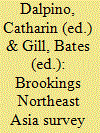

|
|
|
|
|
| Publication |
Washington,D.C., Brookings Institutions Press, 2002.
|
| Description |
x, 119p.
|
|
|
|
|
|
|
|
|
|
|
|
Copies: C:1/I:0,R:0,Q:0
Circulation
| Accession# | Call# | Current Location | Status | Policy | Location |
| 045794 | 327.5003/DAL 045794 | Main | On Shelf | General | |
|
|
|
|
| 2 |
ID:
072744


|
|
|
|
|
| Publication |
New York, PublicAffairs, 2006.
|
| Description |
xiii, 206p.hbk
|
| Standard Number |
9781586484644
|
|
|
|
|
|
|
|
|
|
|
|
Copies: C:1/I:0,R:0,Q:0
Circulation
| Accession# | Call# | Current Location | Status | Policy | Location |
| 051411 | 951.06/BER 051411 | Main | On Shelf | General | |
|
|
|
|
| 3 |
ID:
174232
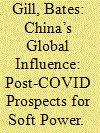

|
|
|
|
|
| Summary/Abstract |
While the world’s health continues to suffer from COVID-19, on pace to be the deadliest pandemic since the outbreak of HIV/AIDS in the early 1980s, great-power competition is alive and well. It is, quite literally as the British say, in rude health. The COVID-19 crisis has injected an already-inflamed US-China relationship with new levels of ill will as each side blames the other for the disease’s spread and struggles to spin global opinion in their favor. The stakes grow ever higher as the blame game further aggravates US-China competition over matters of governance, values, and ideals.
|
|
|
|
|
|
|
|
|
|
|
|
|
|
|
|
| 4 |
ID:
066743
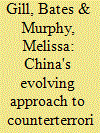

|
|
|
| 5 |
ID:
076834
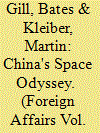

|
|
|
|
|
| Publication |
2007.
|
| Summary/Abstract |
China's recent antisatellite test, which the military conducted while leaving civilian authorities mostly in the dark, raises a disturbing question: Will Beijing's stovepiped bureaucracies prevent China from becoming a reliable global partner?
|
|
|
|
|
|
|
|
|
|
|
|
|
|
|
|
| 6 |
ID:
161323
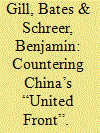

|
|
|
| 7 |
ID:
100446
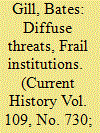

|
|
|
| 8 |
ID:
189327
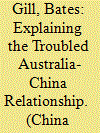

|
|
|
|
|
| Summary/Abstract |
Across a range of indicators, relations between Australia and the People's Republic of China have sunk to their lowest level since they established diplomatic relations in 1972. What explains this dramatic shift in Australia-China ties and what are the prospects for the relationship going forward? Applying a basic neoclassical realist framework, the article argues that Australia's more cautious, distrustful, and defensive policies toward China arise from changes in the international power structure—especially the PRC's emergence as a stronger and more influential actor—and how in turn those changes are interpreted through Australian domestic norms, worldviews, processes, and incentives. The article explores and explains these developments through a discussion of the overarching geostrategic and normative precepts which have consistently shaped Australia's past, present and future approach to the world, including its approach to relations with China; the application of a neoclassical realist framework for understanding the changes in Australian policies toward China; an in-depth look at three key intervening domestic variables which shape Australia's increasingly tough approach to China; and an overview of the key Australian policy outcomes vis-à-vis China. Based on this analysis, the article finds that Australia-China relations will likely face a prolonged period of tension and distrust.
|
|
|
|
|
|
|
|
|
|
|
|
|
|
|
|
| 9 |
ID:
099761
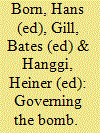

|
|
|
|
|
| Publication |
Oxford, Oxford University Press, 2010.
|
| Description |
xiii, 249p.
|
| Standard Number |
9780199589906, hbk
|
|
|
|
|
|
|
|
|
|
|
|
Copies: C:2/I:0,R:0,Q:0
Circulation
| Accession# | Call# | Current Location | Status | Policy | Location |
| 055418 | 355.8251/BOR 055418 | Main | On Shelf | General | |
| 055998 | 355.8251/BOR 055998 | Main | On Shelf | General | |
|
|
|
|
| 10 |
ID:
165205


|
|
|
|
|
| Summary/Abstract |
The Chinese People’s Liberation Army (PLA) is in the midst of a sweeping reform programme to significantly transform its organisation, force posture, command and control structures, and internal politics. Among the many important aspects of this effort is the establishment of the PLA Rocket Force (PLARF). Creation of the PLARF solidified China’s missile forces as a critical element of China’s evolving strategic deterrent posture, portends continued significant investment in PLARF modernisation, and points to a more concerted effort to integrate PLARF capabilities into more effective PLA-wide joint operations—all key developments in the fundamental reshaping of China’s approach to strategic deterrence. These developments will affect U.S. strategic and extended deterrence postures, U.S.-China strategic stability, allied conventional force operations, information dominance and security, critical infrastructure, and other key aspects of national security. This study details the organisational, technological, and doctrinal changes afoot for the PLARF, and analyses how—if successful—they affect U.S. and U.S-allied military strategy in the Indo-Pacific region.
|
|
|
|
|
|
|
|
|
|
|
|
|
|
|
|
| 11 |
ID:
078373
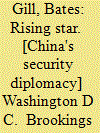

|
|
|
|
|
| Publication |
Washington D C, Brookings Institution Press, 2007.
|
| Description |
xi, 267p.
|
| Standard Number |
0815731469
|
|
|
|
|
|
|
|
|
|
|
|
Copies: C:1/I:0,R:0,Q:0
Circulation
| Accession# | Call# | Current Location | Status | Policy | Location |
| 052488 | 355.03351/GIL 052488 | Main | On Shelf | General | |
|
|
|
|
| 12 |
ID:
073051
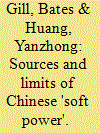

|
|
|
|
|
| Publication |
2006.
|
| Summary/Abstract |
In current analysis and debate concerning China's rise, the subject of soft power is either missing or misapplied. Since the 1990s, China has achieved impressive gains both in terms of soft power resources and the ability to convert the resources into desired foreign-policy outcomes. Unlike the former Soviet Union, China appears to be more successful in developing hard and soft power in tandem. Its steppedup endeavours in expanding its soft power nevertheless continue to be constrained by three factors: imbalance in resources, legitimacy concerns regarding its diplomacy, and a lack of coherent agenda. How Washington and its allies respond to this unique power pattern will shape the future strategic landscape of East Asia and beyond.
|
|
|
|
|
|
|
|
|
|
|
|
|
|
|
|
| 13 |
ID:
017635
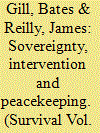

|
|
|
|
|
| Publication |
2000.
|
| Description |
p 41-60
|
|
|
|
|
|
|
|
|
|
|
|
|
|
|
|
| 14 |
ID:
076852
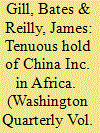

|
|
|
|
|
| Publication |
2007.
|
| Summary/Abstract |
China’s constructive approach with Africa fits squarely within its global strategy to promote China as a peacefully developing and responsible rising power seeking a harmonious world. China does look to Africa’s resources to fuel China’s growth. More broadly, however, Beijing seems to sense that Africa is on the verge of an economic and political renaissance. It wants to get in on the ground floor and be an integral and valued part of that transformation.
Within that broader strategy, China’s “corporate engagement” strategy in Africa consists of several elements. Top Chinese leaders and diplomats create a favorable environment for Chinese investment in Africa through a mixture of prestige diplomacy, economic assistance, and diplomatic support for African leaders. At home, China’s economic bureaucratic agencies encourage Chinese state-owned enterprises (SOEs) to increase their investment and trade with Africa. China’s SOEs implement Beijing’s aid projects, extract strategic natural resources for export back to China or for profit in the international marketplace, and expand their manufacturing bases in China. Chinese workers staff Chinese projects efficiently and at low cost, and Chinese migrants build trade networks and supply chains linking China and Africa. At least, that is the idea.
Since 2000, this impressive policy push has rapidly advanced China’s core strategic, economic, and diplomatic objectives in Africa. Chinese corporations have secured long-term access to key strategic resources. Economic policymakers have leveraged ties to the continent to build a more globalized network of large transnational corporations. The prospects for economic growth and investment have encouraged African leaders to support China’s broader diplomatic effort to portray itself as a peacefully rising power interested in “win-win” solutions and have helped lure African capitals to drop official ties with Taipei in favor of diplomatic relations with Beijing.
Most analysts, however, tend to exaggerate the prospects of China’s corporate engagement in Africa. As it deepens, the Chinese government will more likely find itself hamstrung by what theorists call a powerful “principal-agent” dilemma: an increasing set of tensions and contradictions between the interests and aims of government principals—the bureaucracies based in Beijing tasked with advancing China’s overall national interests—and the aims and interests of ostensible agents—the companies and businesspersons operating on the ground in Africa.
As China’s Africa strategy depends on an ever-increasing number of bureaucratic principals and corporate agents, contradictions between them will likewise increase. There is already ample and growing evidence of Chinese corporations and entrepreneurs taking steps that are at odds with Chinese government interests, creating problems for Beijing’s attempts to promote a positive and constructive image for Chinese engagement in Africa. Looking ahead, Beijing’s ability to rely on its corporate agents to dependably advance its strategic, economic, and diplomatic interests in Africa will further erode. This in turn will likely present new challenges to China’s global influence and overall soft-power strategy.
|
|
|
|
|
|
|
|
|
|
|
|
|
|
|
|
| 15 |
ID:
179149
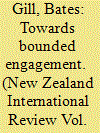

|
|
|
|
|
| Summary/Abstract |
Bates Gill discusses the new normal for US-China relations and what it means for the rest of the world.
|
|
|
|
|
|
|
|
|
|
|
|
|
|
|
|
| 16 |
ID:
124769
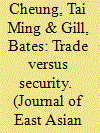

|
|
|
|
|
| Publication |
2013.
|
| Summary/Abstract |
Apart from a short period in the 1980s, the People's Republic of China has been almost completely excluded from access to military and sensitive dual-use civilian-military technologies from the United States and its allies. But in an era of globalization and convergence in the civilian and military technological domains, this compartmentalization of the economic and security arenas has become increasingly difficult to maintain and justify. Major trading countries are caught in the dilemma of balancing restrictions on high technology and other sensitive trade and investment with China against the benefits of deeper ties with the world's second-largest economy. In examining the trade-offs between economics and national security for the United States, the European Union, Israel, and Japan, it becomes clear that China's rise and growing economic and strategic influence introduce new complexities and challenges for controlling militarily relevant technology and knowledge transfers.
|
|
|
|
|
|
|
|
|
|
|
|
|
|
|
|
| 17 |
ID:
145430
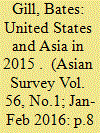

|
|
|
|
|
| Summary/Abstract |
Washington advanced its “rebalance” effort in Asia, with final agreement among the partners of the Trans-Pacific Partnership a major highlight in 2015. However, US diplomatic and military assets remained primarily focused in the Middle East, while the South China Sea and cybersecurity topped a worrisome list of US–China tensions.
|
|
|
|
|
|
|
|
|
|
|
|
|
|
|
|
| 18 |
ID:
152238
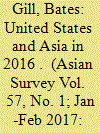

|
|
|
|
|
| Summary/Abstract |
In 2016, US strategic engagement in Asia faced a widening array of challenges emanating both from the region and, troublingly, from within America itself. As the new Donald Trump administration prepared to take office in January 2017, major uncertainties loomed over US Asia policy.
|
|
|
|
|
|
|
|
|
|
|
|
|
|
|
|
| 19 |
ID:
049857
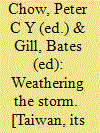

|
|
|
|
|
| Publication |
Washington, DC, Brookings Institution Press, 2000.
|
| Description |
xiii, 234p.
|
| Standard Number |
0815713991
|
|
|
|
|
|
|
|
|
|
|
|
Copies: C:1/I:0,R:0,Q:0
Circulation
| Accession# | Call# | Current Location | Status | Policy | Location |
| 044120 | 330.951249/CHO 044120 | Main | On Shelf | General | |
|
|
|
|
|
|
|
|
|